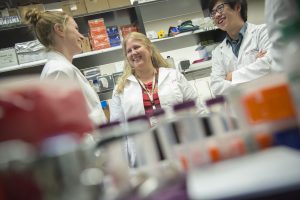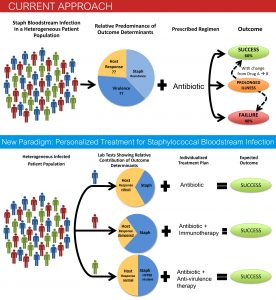The school requested proposals for its first Bensussen Innovation Challenge last year to find those faculty at the school who were conducting cutting-edge translational research, with a focus on moving concepts into practice. Funded projects address diabetes, jaundice and infectious diseases.
Funded by Board of Councilor member Gale Bensussen and his wife, Jane Bensussen, pilot grants have been awarded to support the creative translational research of five talented researchers. The short-term, pilot funding grants are especially geared to projects that need to acquire key data to help secure a larger external funding award.
“I’m hoping this seed funding will prompt creative thinking and open a new door,” says Gale Bensussen. “There is so much creative talent on the Health Sciences campus.”
Two Projects Take on Diabetes
 Associate Professor Kathleen Rodgers’ research will focus on developing a new drug to control diabetes – which causes approximately 72,000 deaths a year. She received a $50,000 grant for the project, “Agonism of the Mas Receptor Improves Metabolic Outcomes in Type 2 Diabetes,” and will collaborate with co-PIs Associate Professor Stan Louie and Associate Professor Bangyan Stiles.
Associate Professor Kathleen Rodgers’ research will focus on developing a new drug to control diabetes – which causes approximately 72,000 deaths a year. She received a $50,000 grant for the project, “Agonism of the Mas Receptor Improves Metabolic Outcomes in Type 2 Diabetes,” and will collaborate with co-PIs Associate Professor Stan Louie and Associate Professor Bangyan Stiles.
“There is a growing need for the development of new, cost-effective therapies to effectively reduce and treat diabetic complications,” explains Rodgers. “This project is focused on the development of orally bioavailable small molecule mimic of A(1-7) that can be effectively used for the control of diabetes with improved patient adherence.”
Professor Wei-Chiang Shen is also researching diabetes with his project, “Proinsulin-Transferring Fusion Protein as a Liver-Specific Anti-Diabetic Pro-drug,” for which he received a $46,100 grant. His research particularly focuses on the negative affects current diabetes drugs have on the liver.
“Current injectable insulin analogs primarily increase the blood insulin level, resulting in an under-insulinized liver,” he says. “In this application, we will investigate a recombinant fusion protein, proinsulin-transferrin (ProINS-Tf), as a novel biologic for diabetes treatment.”
Expanding Opportunities for Collaboration across the University
Professor Annie Wong-Beringer received a $50,000 Bensussen Innovation Challenge grant for her project, “Developing a Personalized Treatment Strategy for Staphylococcus Bloodstream Infection.” She will be collaborating with co-investigators Rosemary She and Kai Wang of the Keck School of Medicine, Emi Minejima, assistant professor at the school, and Wendy Mack of SC-CTSI.
“Our ultimate objective is to personalize treatment of infectious diseases based on individual host immune response and microbial characteristics measurable at the bedside,” explains Wong-Beringer. “Utilizing the combined expertise from a multidisciplinary team from pharmacy, medicine, biostatistics and bioinformatics in genomics, this proposal will build on an existing clinical dataset and elucidate the contribution of host immunogenetics and microbial characteristics to outcomes of S. aureus bacteremia as a necessary step towards developing a personalized treatment strategy to address a significant public health problem.”

Wong-Beringer’s project suggests a new paradigm for treating staph bloodstream infections. Patients receiving the current standard treatment have 40 percent chance of failure (see infographic), leading to complications, relapse, prolonged hospitalization and increased mortality. Her customized approach aims to address the current epidemic of these infections that affect an estimated 50 people of every 100,000 population.
Associate Professor Curtis Okamoto will work with co-PI Associate Professor Bangyan Stiles on the project entitled, “The Protein Kinase LKB1 Regulates Hepatocyte Polarity and Bile Excretion in vivo,” for which he received a $24,300 grant.
“The translational goal of this 1-year project is to provide novel targets and opportunities in the treatment of hyperbilirubinemia and jaundice,” says Okamoto, noting that hyperbilirubinemia is the most common cause of morbidity in the first week of life, affecting 60 to 80 percent of newborns worldwide. “In addition, this project will develop new collaborative opportunities within the school and between the school and the USC Research Center for Liver Diseases, and reinforce current strengths in epithelial cell polarity and cellular metabolism.”
A Systemized Approach to Ensure Quality
The final award went to Assistant Professor Michael Jamieson who received $17,550 in grant funding for the project, “The First Step towards Ensuring the Quality and Reproducibility of the Preclinical Research Data Generated by the school.” Jamieson, who teaches in the School’s regulatory science program, is not conducting research aimed at a specific disease but instead proposes a system to ensure the quality of research in School laboratories.
“The purpose of this study would be to look at developing a centralized system whereby on an annual basis all equipment of one type could be calibrated by an outside vendor at the same time, therefore taking advantage of economies of scale,” explains Jamieson, who also proposed that the School develops standardized templates for documents to “ensure the quality and reproducibility of all the research results generated by the school.”
The award winners were announced internally to the faculty at an informal gathering on March 18, and a more formal presentation is being planned.

